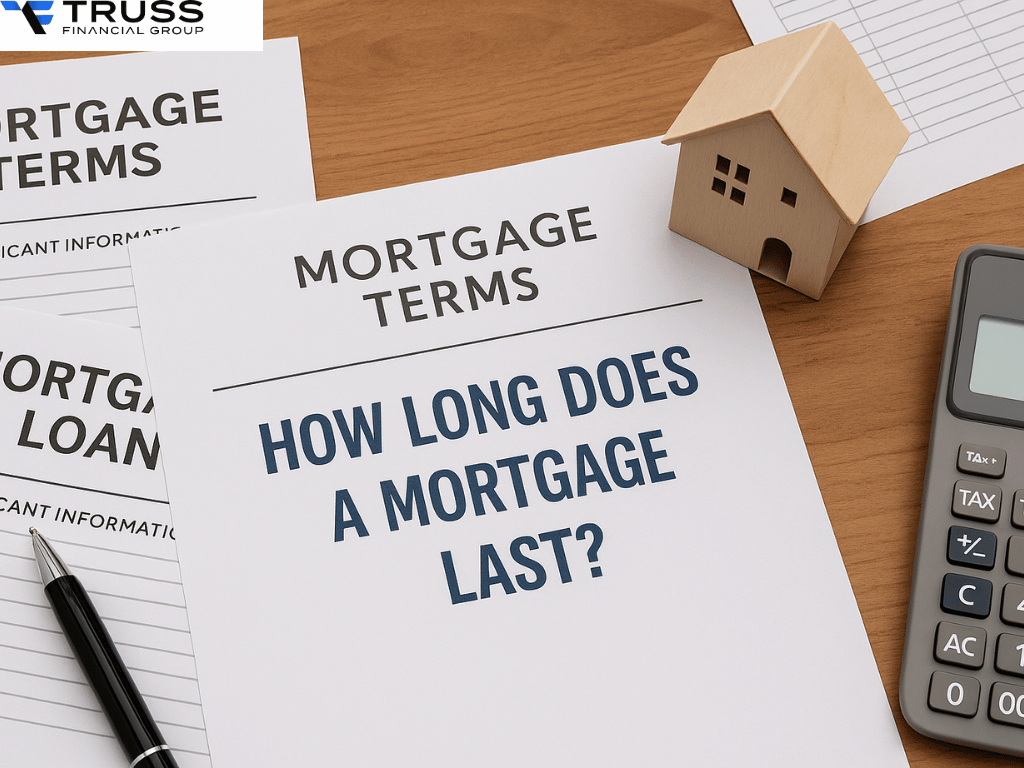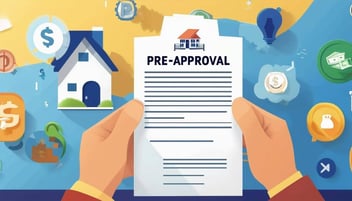7 min read

If you’re wondering how long a mortgage lasts, you’re already thinking like a smart homebuyer.
The mortgage term, the time you have to repay your loan, impacts your monthly payment, interest rate, and total cost.
Most U.S. mortgages are 30 years, though 10-, 15-, and 20-year options exist for different goals.
Choosing the right term means balancing affordable payments with long-term savings. Shorter terms save money on interest, while longer ones keep payments manageable.
Use a mortgage calculator to compare terms and explore options like fixed-rate, adjustable-rate (ARM), FHA, VA, and USDA loans. Making extra payments or refinancing can also shorten your payoff timeline.
Key Points:
-
30-year terms are most common, but shorter terms save interest.
-
Fixed vs. adjustable rates affect stability and risk.
-
Extra payments help reduce years off your mortgage.
-
Always consult lenders for personalized advice.
If you're asking how long does a mortgage last, you're already thinking like a smart homebuyer. The mortgage loan term the length of time to repay your home loan plays a major role in your monthly payments, interest rates, and the total amount you’ll pay over time. While the average mortgage length in the U.S. is 30 years, your actual term could vary depending on your financial goals, income, and the loan types you qualify for.
Choosing the right mortgage term means balancing the benefits of lower monthly payments with the potential savings of a shorter-term mortgage.
Use tools like a mortgage calculator and consult with your lender to explore the best term for your situation. Contact our experts to explore personalized loan strategies that align with your goals.
Introduction to Mortgage Terms
A mortgage term refers to the duration you have to repay your home loan, and it directly impacts your monthly payments, interest rate, and total interest paid. The most common terms are:
-
30-year mortgage: Offers lower monthly payments, but results in more interest paid over time.
-
15-year mortgage: Comes with higher monthly payments but leads to substantial savings and quicker homeownership.
-
10- or 20-year options: Also available and can offer flexibility based on your financial planning.
The best term depends on your financial goals, income stability, and how long you plan to stay in your home.
Types of Mortgages: Fixed vs. Adjustable Rate

Your loan term isn’t the only factor to consider, so is the type of mortgage:
Fixed Rate Mortgages
-
Lock in a consistent interest rate
-
Stable monthly payments
-
Ideal if you plan to stay long-term and prefer predictability
Adjustable Rate Mortgages (ARMs)
-
Begin with a lower rate during the introductory period
-
Rate adjusts periodically after the fixed term
-
Best for borrowers who plan to refinance or sell before rate increases
Understanding your tolerance for rate changes and financial risk is key when choosing between these mortgage options.
Average Mortgage Length in the U.S.
The average mortgage term in the U.S. is 30 years. But most borrowers don’t keep the mortgage that long:
-
Many refinance into better rates
-
Others sell the home or make extra payments
Even if you begin with a 30-year term, strategies like biweekly payments or lump-sum contributions can significantly reduce your loan’s actual duration and help you build equity faster.
Exploring Additional Mortgage Options
Beyond standard terms and rates, you may qualify for special loan types:
-
FHA loans: Require a lower down payment, ideal for first time homebuyers
-
VA loans: Designed for veterans, offering zero down payment and no mortgage insurance
-
USDA loans: Offer favorable terms for rural homebuyers
-
Interest-only loans: Temporarily reduce monthly payments, but may lead to higher payments later
Always review your credit report and long-term financial plans when considering these mortgage options.
Adjustable Rate Mortgage Considerations
Adjustable rate mortgages offer benefits and risks:
-
Lower starting rates and monthly payments
-
Rate may increase after the introductory period
-
Often include caps to limit spikes in interest
ARMs are suited for buyers with short-term plans but can be risky if you’re uncertain about your future income or location.

Choosing the Right Loan Term
Here’s how different loan terms compare:
Shorter Term Mortgages (10–15 years):
-
Pay off your home loan faster
-
Save on total interest
-
Take on higher monthly payments
Longer Terms (20–30 years):
-
Provide manageable payments
-
Spread out costs, making budgeting easier
-
Result in more interest paid over the life of the loan
Match your choice to your budget, financial goals, and homeownership timeline.
Making Extra Payments to Save Time and Money
Making extra payments can help you pay off your mortgage in half the time:
-
Add an extra payment annually
-
Round up your monthly payments
-
Switch to biweekly instead of monthly
Before starting, confirm with your lender that there are no prepayment penalties.
First-Time Homebuyer Tips

First time homebuyers often qualify for better loan terms:
-
Reduced mortgage insurance
-
Lower down payments
-
Access to payment assistance programs
Key tips:
-
Secure a mortgage preapproval and a strong preapproval letter
-
Compare offers from multiple lenders
-
Factor in long-term costs, not just monthly payments
Understanding your options helps you make a confident first purchase.
What to Consider When Choosing a Mortgage Term
Before committing to a mortgage term, evaluate:
-
Your future income potential and job stability
-
Your comfort with higher monthly payments
-
Your desire to pay off your loan quickly vs. prioritize other financial goals
-
The likelihood of refinancing or selling your home
Choosing the wrong term can lead to financial stress, so be honest about your lifestyle and priorities.
Calculating Mortgage Payments Accurately
Use a mortgage calculator to understand:
-
Your monthly payments
-
Total interest over time
-
How extra payments reduce your balance
Don’t forget to add:
-
Insurance premiums
-
Property taxes
-
HOA fees, if applicable
A clear calculation ensures you’re budgeting realistically for homeownership.
FAQ: Common Questions About Mortgage Terms
What is the average life of a mortgage?
30 years is the standard term, though many buyers pay it off early.
Can a 70-year-old woman get a 30-year mortgage?
Yes. If she qualifies financially, age is not a barrier.
How much is a $300,000 mortgage for 30 years?
At 7% interest, about $1,600 per month (excluding taxes and insurance).
Is a 30-year mortgage a bad idea?
Not always. It provides lower monthly payments and flexibility, though it comes with more interest paid overall.
Final Thoughts
Knowing how long a mortgage lasts means more than understanding loan terms, it’s about choosing a path that aligns with your financial situation and future goals. Whether you want to build equity quickly with a shorter-term mortgage or secure manageable payments with a 30-year plan, understanding your mortgage options is essential.
Always work with a trusted lender, use calculators to project costs, and consider how extra payments and loan structure affect your outcome. Your mortgage shouldn’t just fit your budget today, it should support your long-term financial health.
Need help choosing the right mortgage term? Contact Truss Financial Group for expert insights and tailored solutions.
Table of Content

Take your pick of loans
Experience a clear, stress-free loan process with personalized service and expert guidance.
Get a quote

